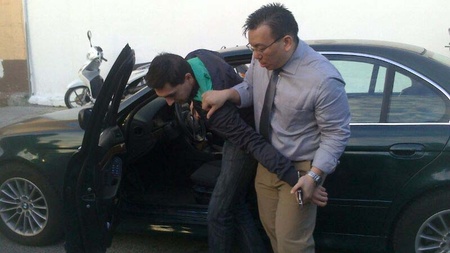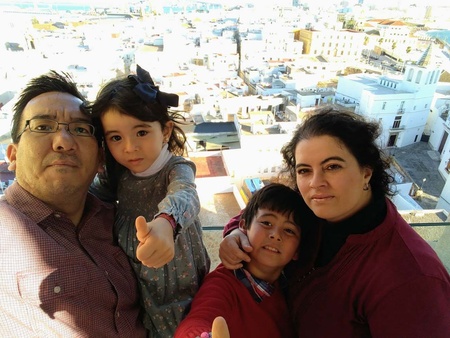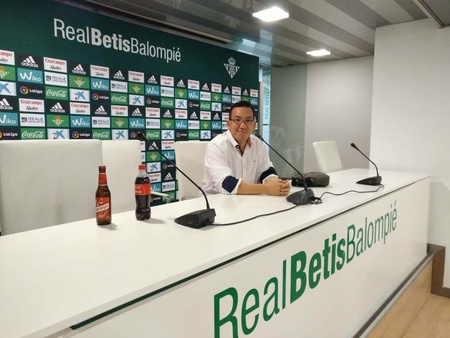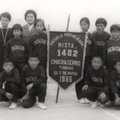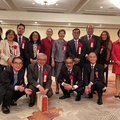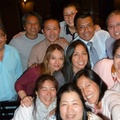“I am the first Nikkei candidate for a councilorship in Spain. "Shit!" Gabriel Ueda tells me. Series. Is happy. Beyond the result of the elections, being appointed to a mayoral list of the Ciudadanos party in the city of San Fernando, Cádiz, where he resides, is already an achievement.
The nomination did not rain from the sky. He earned it hard. More than 15 years ago he landed in Spain and had to make his way from below. Luckily, he was not alone. He always had the support of his wife, a Spanish woman named Paula, whom he met through the internet.
After a brief period in Japan as a dekasegi , Gabriel returned to Peru, but it didn't take him long to take flight again, this time to Cádiz. However, Spain would be different from Japan. He moved to his grandparents' country to work for a short period. He traveled to Spain to start a family and settle permanently.
FULL INTEGRATION
Gabriel practiced journalism in Peru, but he was always attracted to security issues. In Spain, he began taking private security courses and later specialized in other areas, such as jihadist terrorism. Today he works in a security company, is a judicial expert in private security, teaches classes on the subject, is a canine instructor and gives talks on terrorism, among other things.
His experience in security made his arrival at Ciudadanos possible. He gave a talk on the subject, he liked it and then he joined the group. In May there are the elections and there we will know if he becomes the first Nikkei councilor in Spain.
“I honestly can't complain at all,” he says about his life in Spain, where his two children were born. But it is also true that no one has given me anything. Each achievement achieved has been based on effort and improvement, and also due to the support of my wife and my Spanish family. I have a normal life. I don't ask anything more from life, only health for my children and work that never fails.
The Peruvian sansei chose to completely immerse themselves in Spanish society, not to live like an amphibian, in the middle of the water, with one foot in and one foot out.
“In Spain, either you are Spanish or you are an immigrant... you decide for yourself. Let me explain better: I have been here for more than 15 years and I have never felt the need to be with other Peruvians or Nikkei. I have always tried to integrate. I speak from my humble perspective. I believe that one has to integrate into the country that welcomes one, learn to love it, to respect it, and that can only be achieved by knowing it. “You can’t want something you don’t like,” he says.
When in November 2017 the entire Peru celebrated the historic qualification of its soccer team to the 2018 World Cup in Russia, Gabriel realized how much it had transformed: “When Peru went to the World Cup it gave me joy, but I thought it was going to exciting as a Peruvian and fan of Alianza Lima. What's up! I was happy that you qualified, but I wasn't as excited as when Spain won the World Cup (in South Africa 2010). I think that means that my integration process is complete.”
Now, his total immersion in Spain does not mean that he has extirpated his Peruvian origin or his Japanese ancestors from his life. He talks a lot about them to his children:
“I explain to them about their grandparents (nisei) who were children of Japanese immigrants, and I tell them the truth, that those first Japanese who sailed the sea to make a future for themselves (in Peru) suffered a lot to support their families. Those pioneers deserve all my respect. As I tell my son: 'You have to have two pairs of balls' to leave everything behind and cross half the world without knowing what destiny has in store for you. I believe that the best legacy of Nikkei identity that those pioneers could have left is knowing how to fight against destiny, that nothing is impossible and that all dreams can come true based on work and effort. “Nothing comes for free.”
IN PERU, “CHINESE”; IN SPAIN, “JAPO”
Anyone who met Gabriel Ueda in Peru and speaks with him now listens to him in disbelief, as if he were another person.
"Hey, he speaks like a Peruvian," I tell him.
"Fuck, man, I can't," he replies.
Although he speaks like any other Spaniard, it is inevitable that in Spain he draws attention to his slanted eyes. “Because of my Chinese face they know that I am from outside, but then they see my children, half Spanish and half 'Japanese', and they have complete doubt (laughs),” he says.
“Dad, why do your friends call you 'Japanese'?” his children, Gabriel, eight years old, and Paula, four, ask him.
“They say it to me with great affection and respect, it's like in Peru they called me 'Chinese'. Here I am the 'Japanese'. I explain to my children where I come from and that Japanese blood runs through their veins, and the first thing they tell me is: 'Like Shin- chan ' (laughs).”
No matter how much he has become Spanishized and maintains a certain distance—not only geographically, but also mentally, soccer-wise, and culturally—with Peru, there is something that he cannot overcome, that overcomes him, that manages to bring out his Peruvianness. “I miss Peruvian food a lot. Since there is no such thing anywhere in the world, our food has everything,” he says.
Something that catches your attention: when it comes to the Peruvian soccer team he says: “I was happy that you qualified,” but when he refers to Peruvian food his point of view changes: “Our food.”
His dekasegi stage is a distant memory, but it left its mark on him. Like the vast majority of Nikkei, in the land of his ancestors he realized that he was a simple foreigner.
“Japan taught me that I will always be a Peruvian for them, a gaijin . I learned that to earn the respect of the Japanese you have to learn to think like them, to speak their language, learn their culture, their way of life. Did my identity change? I understood that in Peru we treat the Japanese who go as if they were beings from another galaxy, and the Nikkei who have broken their faces and continue to do so, working there, leaving behind family, children, partners, have been treated in a similar way. "mostly as gaijin , they have been despised."
If in Japan he felt like a foreigner, in Spain he is at ease. It's your home. “I owe Spain what I am now on a professional and family level. It gave me the opportunity to get to where I have arrived, to have good friends, to be able to develop as a person and to be able to integrate. And look, there is racism here too, just like in Japan. “A very strong anti-immigrant current has emerged in Spain.”
YOUR CAUSITA RONALDO
His work has taken him to soccer stadiums, where he has been part of the security team in first division matches of the Spanish league. In January 2014, he had an amazing experience when he met the world football star, Cristiano Ronaldo, during a match between Real Madrid and Real Betis at the Benito Villamarín stadium in Seville, and the Peruvian “came out.” He and another security agent were assigned to the locker rooms, to the envy of the rest of his colleagues who wanted to be close to the footballers.
“Among all of them, CR7 obviously stood out, who stood almost next to me preparing to go out onto the field. The thing is that suddenly I saw Cristiano and I locked eyes with him. Until that moment the guy was going to his party, he didn't pay attention to anyone in particular, he just combed the hair gel out of his hair. When we locked eyes again, I shook his hand and he very cordially returned my greeting. But I went further, something came out of the depths of the Peruvian heart. I told him half shouting because the noise there was was deadly: 'Let's go causita 1 ... let's win!!', accompanied by a pat on the back as if we were really causitas," he says.
"CR7's face was a total surprise because logically he had not understood that Peruvianism that is so common, so street, so neighborhood, but there was the good CR7 answering my harangue with an 'obrigado'. They just announced that the players can now go out onto the field and behind him comes Pepe (the great machete player in the Madrid area). Thinking that Cristiano was a friend of mine, he shakes my hand and greets me with a smile and a pat. My partner's face was full of laughter. He told me: 'Fuck! You are the rock, man!! “You have shaken hands with Cristiano!!” (Incidentally, Madrid won 5-0 and CR7 scored a goal).
Since he migrated to Spain, Gabriel Ueda has not returned to Peru. He doesn't know when he will do it. Maybe he travels with his wife and children, so they can get to know the country where he was born. Some day. The only certainty he has is that when he lands in Peru he will feast on delicious Peruvian food, the one he misses so much.
Grades:
1. Causa or cause: Peruvian slang meaning friend.
© 2019 Enrique Higa Sakuda


